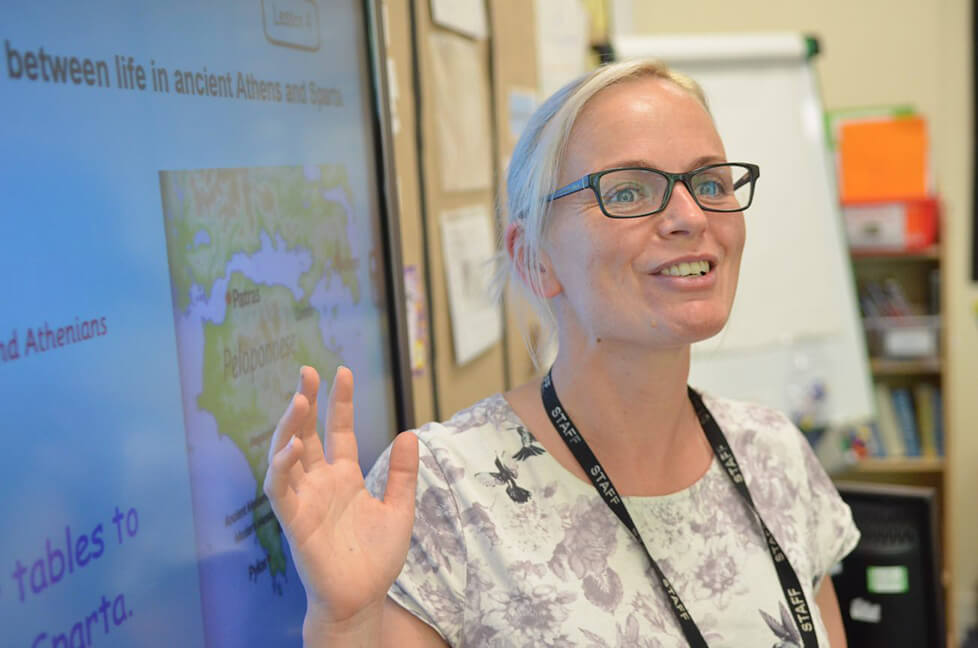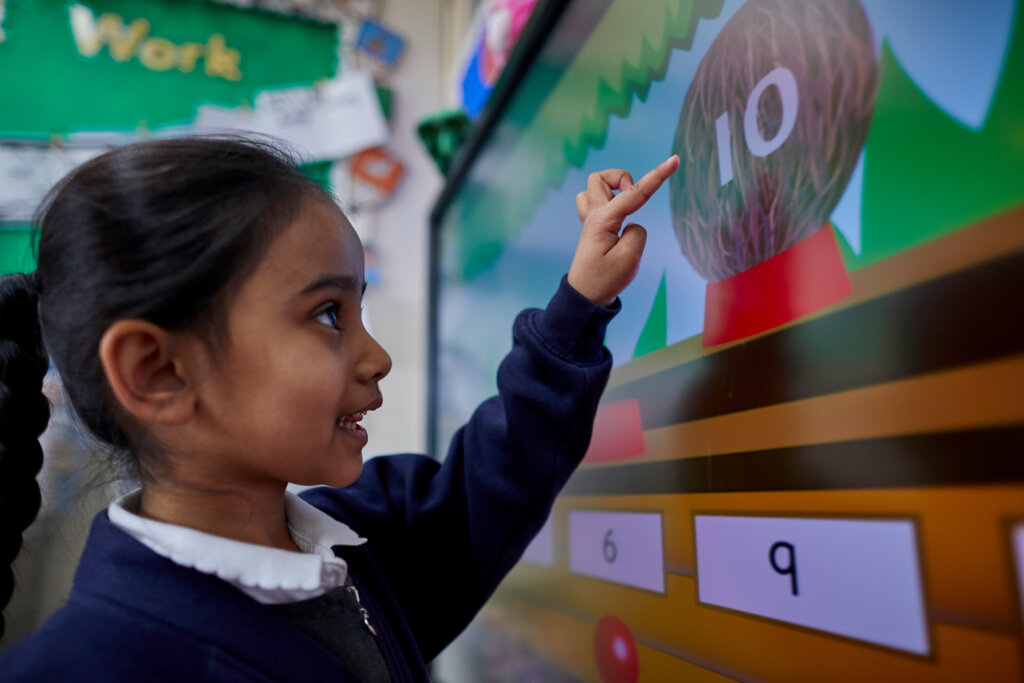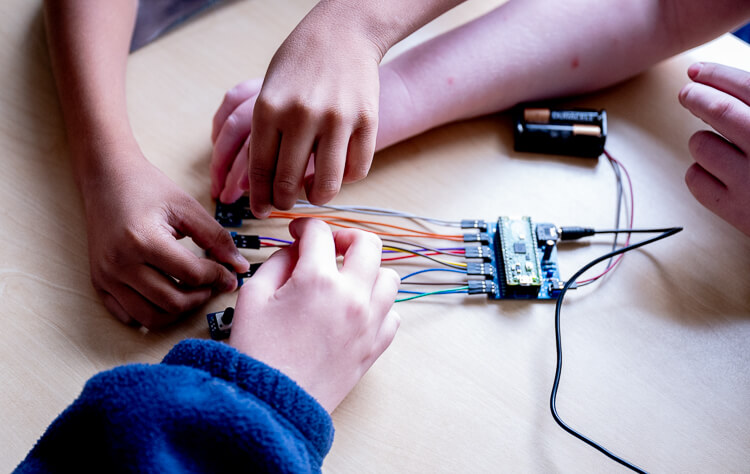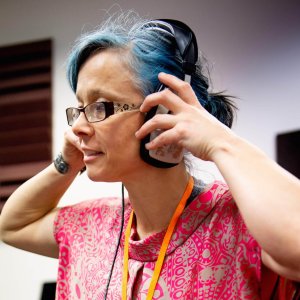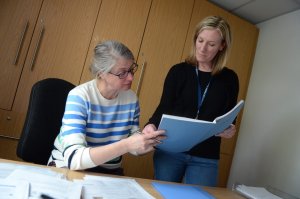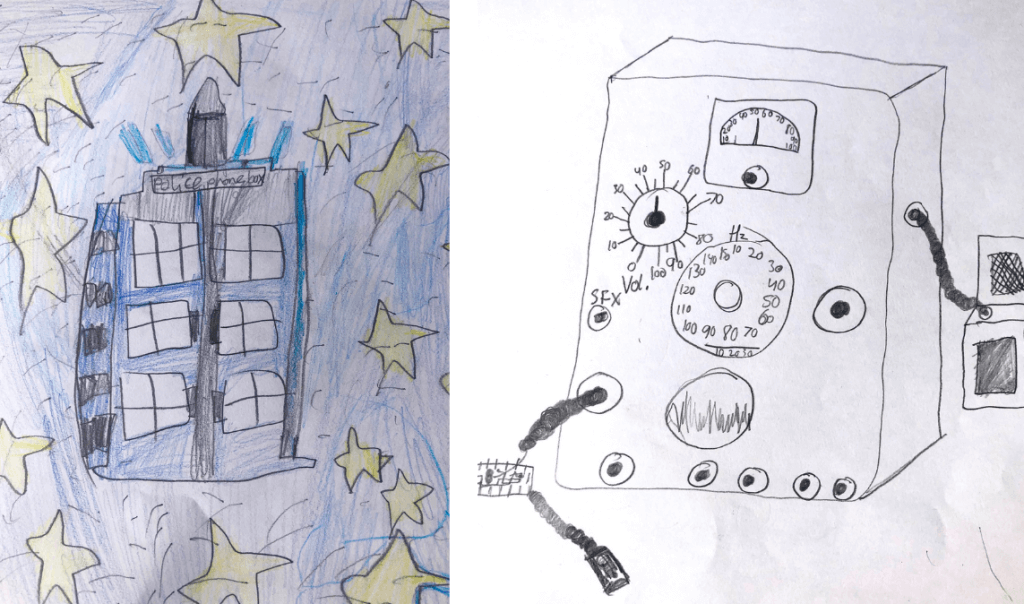
We are excited to have been able to work with 300 school children in Manchester this year, delivering 10 Inspirational Days to Year 5 and 6 pupils. We are very grateful for the support of One Education Music in recruiting the schools who took part. Here, we will summarise the day as we designed creative activities as a way to unlock the heritage and history around the 60th anniversary of the BBC sci-fi series Doctor Who.
The woman who produced the original theme in 1963, purely electronically, was none other than Delia Derbyshire, whose archive collection lives at John Rylands Library here in Manchester. Hence why Delia Derbyshire Day was set up, as we hoped the heritage could act as a rich source of education and inspiration, which seems to be the case. These activity days covering heritage, music, STEM and film/media production were free of charge for schools and made possible thanks to National Lottery Heritage Fund support.
Our ‘Inspirational Days’ started with an introduction to us, including letting the children know that all the female facilitators were also industry-active electronic music artists and/or engineers. DD Day therefore offers role models past and present in the electronic music and audio engineering sector. In order to introduce the children to Delia Derbyshire herself, we showed them the film we made with school children in 2017, also with the support of One Education Music. We quizzed the children and asked for feedback on the film to check comprehension and they seemed to enjoy being educated about Delia by other children supported by multi-media aspects such as animation and graphics.
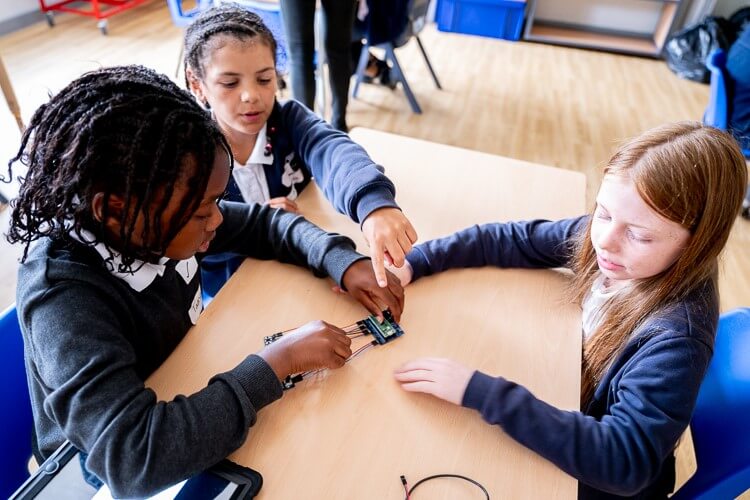
We then introduced the Doctor Who show itself and uncovered a few Whovians (Doctor Who fans) who could tell their class about the series. We explored the heritage of the diaries of Waris Hussein, the director of the first episodes of Doctor Who, which were generally quite hopeless about the show. Please see the new film below that the children made this year to learn more about this. One aim of these Inspirational Days was to make the children aware of the diverse original team who worked on Doctor Who – again to act as role models the children can relate to, but also to share how they overcame challenges which are quite common in life and at work.
Next, we began deconstructing the revolutionary original theme tune. It was produced in 1963, a time before computers and synthesisers. The children were able to pick out the different sounds and layers and appreciate its mysterious nature due to its function: to introduce a drama about adventures in time and space. The theme has undergone many reincarnations over the 60 years so we carried out a compare and contrast activity with the children, bringing in music appraisal and critical listening skills. The 2018-2022 theme tune by Segun Akinola (which was heavily inspired by Delia’s production) was particularly popular but some children still preferred Delia’s realisation as they felt it was more mysterious. We also compared the sound design for the classic Doctor Who ‘Sea Devils’ story which was revisited in more modern Doctor Who. Here, most children preferred the original sound design as it was more eerie and suitably strange. The more modern rendition employed sound design language we are very familiar with and it was great to hear the children were tuned into this.
After their morning break, we split each class into 2 groups. We designed an activity exploring our digital facsimiles from the Delia Derbyshire Archive – with kind permission from the Delia Derbyshire Estate and support from the John Rylands heritage specialist team. These were a variety of paper items from newspaper clippings to working notes and correspondence relating to Delia’s work on Doctor Who. The children were invited to put on their detective hats and work out what the notes and marks meant. They then presented their conclusions to the rest of the group. Their imaginations were often fairly accurate and even details like coffee cup stains did not go unnoticed. They were then invited to create an artefact that might sit in their own archive, were they to have one. In this way, they were embodying the value of an archive and this reaped some unique documents: they created football tactics, concert tickets, letters and drawings to define themselves and their interests. Most of the children did not know what an archive was at the beginning of the session, so this allowed them to learn about heritage and the forms it can take.
🌟🎶 Music technology comes to life! As we approach #DeliaDerbyshireDay, @DeliaDDay workshops are empowering pupils to explore the wonders of electronic sound.
— One Education Music (@OneEdMusic) November 20, 2023
With their own DIY "wobbulators," pupils are creating music history of their own! @TheJohnRylands @HeritageFundUK pic.twitter.com/mSkqq3M4AO
The second of the split class activities was to create their own ‘wobbulator’ from an electronic solderless circuit board. As part of our National Lottery Heritage Fund support, we were able to commission electronic music instrument maker Nina Richards to design and build a modern re-creation of a machine nicknamed the ‘wobbulator’ by Delia and her sound exploring colleagues at the BBC. It was basically a very simple kind of synthesiser as you can ‘wobble’ frequencies by adjusting the modulation and speed/pitch of various shaped wave forms. The children followed assembly instructions (available in a variety of formats) and faces lit up as the green light came on to show the circuit was ready to play. They worked really well in small teams and then seemed to enjoy exploring the range of swooping and sweeping sounds the wobbulator could produce. We challenged them to try and re-create some of the elements of the Doctor Who theme such as phrases from the bassline and melody.
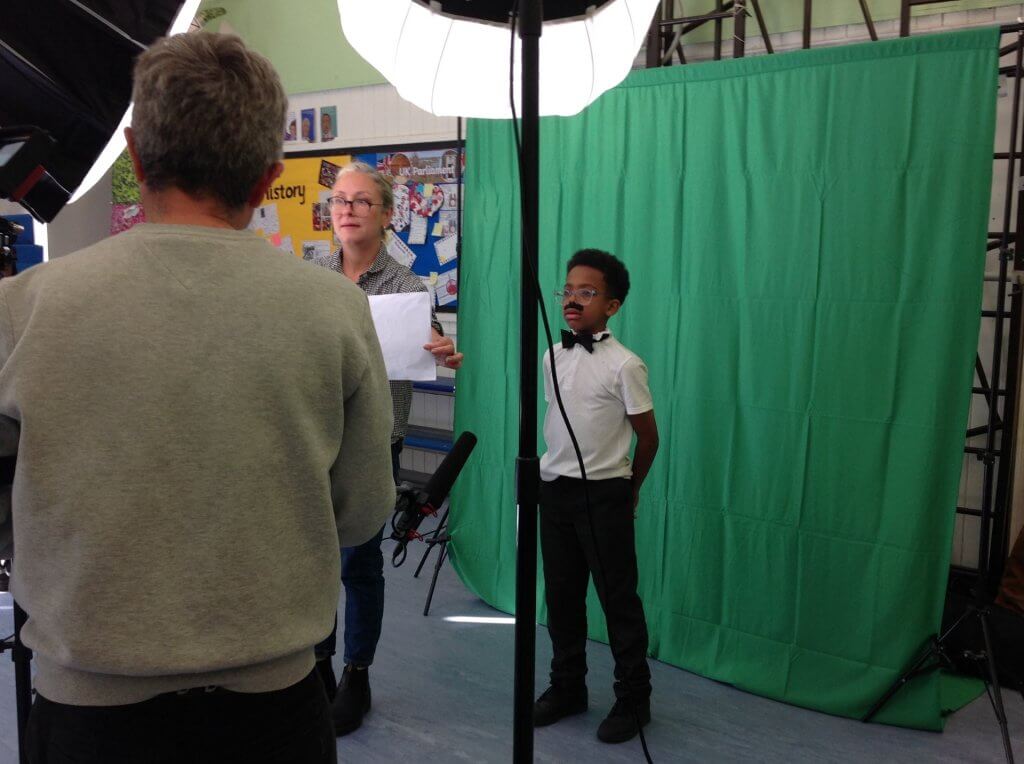
The afternoon session was focused around producing the short film ‘Doctor Who at 60: The Origin Story.’ This was designed as a fun and active way of consolidating what they had learned in the morning. Five of the classes were visited by Belle Vue Productions who we enlisted to produce the film. We hoped the presence of a green screen, film camera, lights and a boom (microphone) offered an exciting opportunity to experience how films are made. Of course there were lots of things that needed doing behind the camera like sound effects, music, script writing, props and graphics for animation. The children produced some amazing work which we tried our best to fit into the film.
We ended the day with a short quiz and some evaluation with the children and staff. 98% of the children reported really enjoying the day with making the ‘wobbulator’ and producing the film being the most popular activities. Only one child did not enjoy the day because they had to miss P.E which is fair enough! We hope this film produced by Belle Vue Productions is testament to how enthusiastically the children participated in the day.
We’ve had a wonderful time celebrating the life and works of Delia Derbyshire – thanks to all the pupils who made this occasion even more special with their boundless creativity and passion.
We’re proud to ensure children have access to a high-quality music technology education, giving them hands-on learning experiences that inspire innovation, problem-solving, and collaboration. Delia Derbyshire Day is also a fantastic opportunity to shine a spotlight on female and diverse role models in STEM and British electronic music past and present. We want to empower children that anyone, regardless of their background, can make an extraordinary contribution to the world of science, technology, engineering, and music. By coming together to embrace our musical heritage, we believe we can open doors into the creative and technical worlds to pave the way for future success.
Please visit deliaderbyshireday.com to learn more about our work.
Photo credits: Shirlaine Forrest.
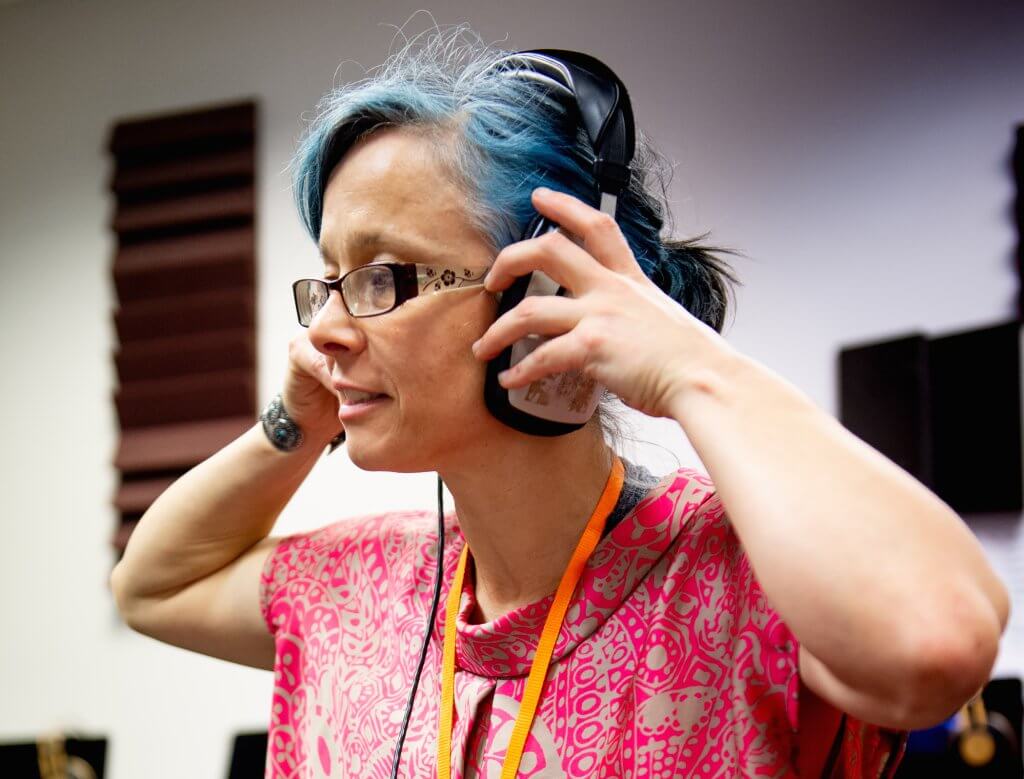
About the Author
Caro C is the instigator and project manager at Delia Derbyshire Day (DD Day). Delia Derbyshire Day is a registered charity that aims to advance the education of the public in music technology as well as the history and art of British electronic music via the archive and works of Delia Derbyshire.
Please complete the form below and we will get in contact as soon as we can to help you with your query.






